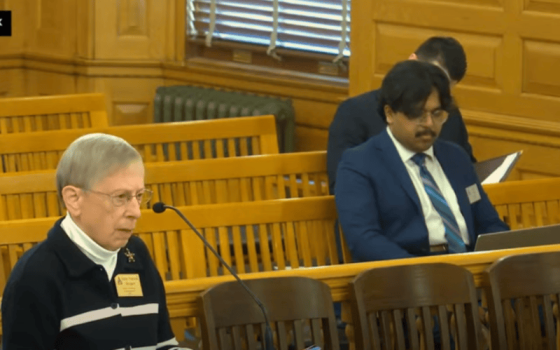
WASHINGTON -- With more legislatures taking public frustration over immigration-related problems into state-level hands, President Barack Obama renewed his commitment to putting his political weight and the resources of his administration behind a federal approach to reform.
But as he told participants in a White House meeting April 19, the responsibility for legislation to fix the multilayered immigration mess lies with Congress.
Bishop John C. Wester of Salt Lake City, one of dozens of religious, political, business and civic leaders who attended the White House meeting, told Catholic News Service April 21 that he came away from the session more optimistic about the possibility of getting a comprehensive immigration reform bill passed than he was when he arrived.
But he acknowledged that after years of working with similar diverse coalitions on the subject, "I've been there too many times to get my hopes up."
Comprehensive immigration reform proposals generally include some enforcement provisions; expanded ways for low-skilled workers to come legally into the United States; changes in family-based immigration procedures; and a path to legalization for the estimated 11 million people who are in the United States illegally.
As the group gathered in Washington, Georgia's legislative staff was putting the finishing touches on a bill passed April 14 that would broaden the powers of local police to enforce immigration laws and require businesses to use an online verification system when hiring. The bills also would create criminal penalties for assisting people who are in the country illegally.
Gov. Nathan Deal said he would sign the bill when it reached his desk, in spite of the ongoing protests against the legislation, including by the state's Catholic bishops.
In a March statement as the legislation was being considered, the bishops said that while nations have the right to control their borders, "the human dignity and human rights of undocumented immigrants should be respected at all times, whether they are at work, at home, at school or participating in community life."
Georgia legislators said their bill was written to avoid some of the judicial challenges that put Arizona's similar law, passed a year ago, into legal limbo.
The 9th U.S. Circuit Court of Appeals April 11 upheld a stay on implementation of the most contentious enforcement provisions of S.B. 1070, saying, "We are not persuaded that Arizona has the inherent authority to enforce the 'civil' provisions of federal immigration law." Yet to be decided by the appeals court is whether the Arizona law itself is constitutional.
The Indiana House April 21 passed a bill requiring employers to verify workers' immigration status and mandates steps to ensure undocumented immigrants are not receiving welfare benefits.
The House version eliminated a provision from the Senate version of the bill that would require police officers to investigate people's immigration status. Bishop Dale J. Melczek of Gary, Ind., was among protesters who marched in early April from Hammond, Ind., to East Chicago, Ind., to express their opposition to the legislation.
Similar legislation also was pending in Florida, where neither House nor Senate versions had made it to a vote by the full body as of April 22.
Dozens of other states have taken up similar bills, though most have ended up going nowhere.
A White House statement about the April 19 meeting said "the president made it clear that while his administration continues to improve our legal immigration system, secure our borders, and enhance our immigration enforcement so that it is more effectively and sensibly focusing on criminals, the only way to fix what's broken about our immigration system is through legislative action in Congress."
Obama asked participants to "get the word out, to galvanize support" among their constituencies, Wester said. He said he attended the meeting at the request of Los Angeles Archbishop Jose H. Gomez, who chairs the U.S. bishops' migration committee but was unable to attend because of Holy Week obligations in California.
Among those at the session were: the secretaries of the U.S. departments of Labor, Interior and Homeland Security -- Hilda Solis, Ken Salazar and Janet Napolitano, respectively; Attorney General Eric Holder, and White House domestic and economic policy advisers.
Others included the president of the National Association of Evangelicals; New York Mayors Michael Bloomberg of New York and Julian Castro of San Antonio; current and former police chiefs or commissioners of Los Angeles, New York and Philadelphia; former California Gov. Arnold Schwarzenegger; several former Cabinet members; and representatives of the AFL-CIO, Business Roundtable and other organizations.
Wester said one theme of the discussion was the need "to reframe the conversation," to eliminate the perception that fixing immigration problems is an either/or choice between enforcement or "being a bleeding heart."
"Those are not the only valid options," Wester said. "There could be enforcement and compassionate protections for vulnerable people."
[Photo credit: Members of Our Lady of the Americas Mission in Lilburn, Ga., stand with a sign as they join thousands of protesters gathered in front of the Georgia Capitol in Atlanta March 24. The demonstrators voiced their opposition to what they say could lead to rac ial profiling in immigration bills under consideration by Georgia lawmakers. CNS photo/Michael Alexander, Georgia Bulletin.]



